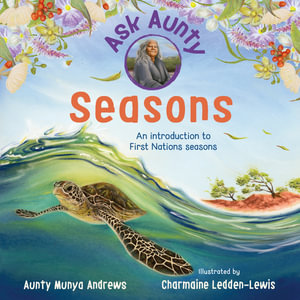Ask Aunty Seasons: An introduction to First Nations seasons by Aunty Munya Andrews and Charmaine Ledden-Lewis

Ask Aunty Seasons is a wonderful new release that beautifully tells the story of the seasons of Bardi Country in the Kimberley of Western Australia. Author Aunty Munya Andrews is an Aboriginal Elder who has a responsibility to teach others about her culture and Country. She also co-director of Evolve Communities where she runs cultural awareness training. This stunning book is the first in a series of books by Aunty Munya. The delightful front cover, the informative endpapers and the full page illustrations are striking. The use of traditional colours of land, sea and sky in soft tones adds a sense of gentleness to this engaging story of the seasons.
The traditional four seasons we are familiar with do not necessarily fit in many First Nations cultures. All over Australia, many First Nations people live and interact with seasons differently. In Bardi Country there are six seasons:
1. Mankal (pronounced Mung-al) wet season: January-February
2. Ngaladany (Ngala-dani) wet season ends: February-March
3. Irralboo (Irall-boo) big tides and mosquito season: April-May
4. Barrgan (Barr-gan) bush fruits and dugong season: May-August
5. Jalalay (Jala-lay) fat stingray season: September-October
6. Lalin (La-lin) married turtle season: November-January
As each season is introduced, the reader finds out what sets that season apart from others and its connection to Country. The language of the Bardi people is used throughout with a change of text colour and at the end Aunty Munya explains how to pronounce them and shares further information. There is also a list of two websites for useful information about Indigenous calendars and seasons as well author and illustrator acknowledgements.
This is a must-have book for all school and public libraries.
Themes: Seasons, First Nations, Bardi Country, Connections.
Kathryn Beilby